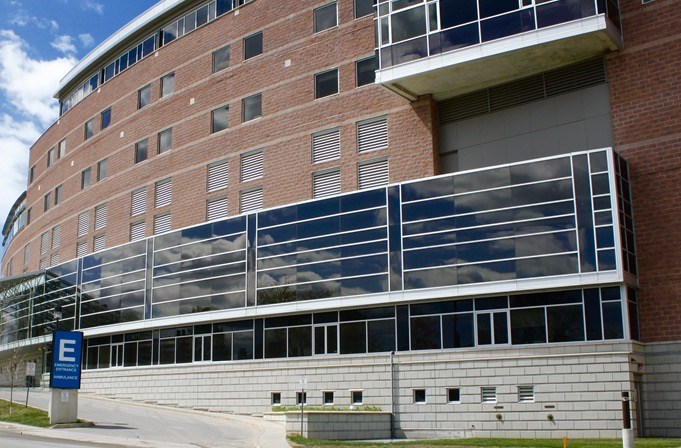The front-line staff at Orillia Soldiers’ Memorial Hospital (OSMH) are under “incredible stress” but faring well - so far - as the harsh realities of a global pandemic begin to become a way of life in the halls of our hospitals.
Dr. David Evans, a family physician and emergency room (ER) doctor at OSMH, says excellent planning, detailed preparation and diligence from staff at every level have been critical in meeting the demands of the battle against COVID-19.
But, he fears, it may not be enough.
“I’m worried like every physician in Canada is worried and people should be worried,” Evans said in an interview with OrilliaMatters. “We are taking every necessary step we can but the reality is there remains a potential for this to do what it’s done in New York and Italy. And if that happens, it could overwhelm our health-care system in Orillia and (we might) not be able to keep up.”
That is why, he repeatedly stressed, it’s vital for all citizens to heed the call of health officials and stay at home.
He said individuals need to recognize that their non-essential outings can lead to the spread of the virus, that could infect a vulnerable person that could lead to death.
“I don’t think we’re doing enough,” said Evans. “It would always be better to look back and say we overreacted instead of saying, later, we didn’t do enough.”
He cautioned that the situations that have spiralled out of control in places like Italy and New York started just as things have started here. He also noted hospitals in New York had more capacity than a hospital such as OSMH that is routinely 95 per cent occupied.
And that’s what keeps him up at night.
“At the current moment, the hospital has all required, sufficient personal protective equipment (PPE), masks, gowns, ventilators… that we need to do our job,” he said. “But we don’t have the normal stockpiles of those items and if we get a massive increase in patients, we will be running out of those things.”
In more normal times, he said, it’s easy to order hundreds of masks and expect delivery the next day. These are not normal times. Today, competition for these items is intense - and global.
“The fact is there is that potential to run out,” he said of that life-saving equipment. “I compare it to climbing a staircase. We have a lot more stairs to climb.”
Sufficient staff is also an issue that could prove lethal.
“We have talked in the ER about doubling the numbers of doctors on any given day (to meet surging demand) which not only means twice the number of masks and gowns but a lot of stress” on already overworked personnel.
With a finite number of front-line staff, it would require long hours and creative thinking. They have already begun to create isolated spaces at OSMH that could be used by staff, should it become necessary to sleep and stay at the hospital.
In addition, some surgeons and specialists, who have less volume of work due to the cancellation of elective surgeries and are already being tasked to help out in other ways, could be asked to look after patients for physicians like Evans who juggle a family practice with work in the ER.
Evans said they are working tirelessly to prepare because they know a spike is imminent.
For example, he said, essentially, there are now two parallel ERs operating at Soldiers’ - one they call a ‘hot-spot’ for those with COVID-19 symptoms and one for others.
“It is a time of great change,” said Evans, who knows the ability to adapt will be key in the coming days. He said hospital leadership did "excellent work" to prepare for the pandemic.
“It’s guaranteed it’s going to get worse before it gets better … we just don’t know how bad it’s going to get,” said Evans. “The biggest fear is seeing scenarios like we’re seeing in New York. That’s what we’re trying to avoid.”
But the spectre of that, coupled with the other fears of running out of life-saving ventilators and protective equipment, creates a lot of stress in hospitals.
On top of that, “every physician and nurse and person who works at the hospital is concerned about their own health, about bringing this virus home to our families. That’s on everyone’s minds.”
As president of the OSMH medical staff association, Evans works with the medical affairs office of the hospital to attempt to mitigate those issues and provide support to physicians.
“We’re working on several fronts to help physicians manage stress,” said Evans, who noted peer support groups have been established. He said at Friday’s “compassion rounds” an expert will speak, virtually, to doctors about fatigue, stress and other issues.
Evans said a buddy system has also been implemented so that each person in a key role has a back-up person ready to step in and help when needed.
Keeping front-line workers healthy is vital, he said.
“It’s not that our health is more important than anyone else's, but our jobs, perhaps, are a bit more important right now,” said Evans. “So we know it’s important to do what we can to support one another.”
